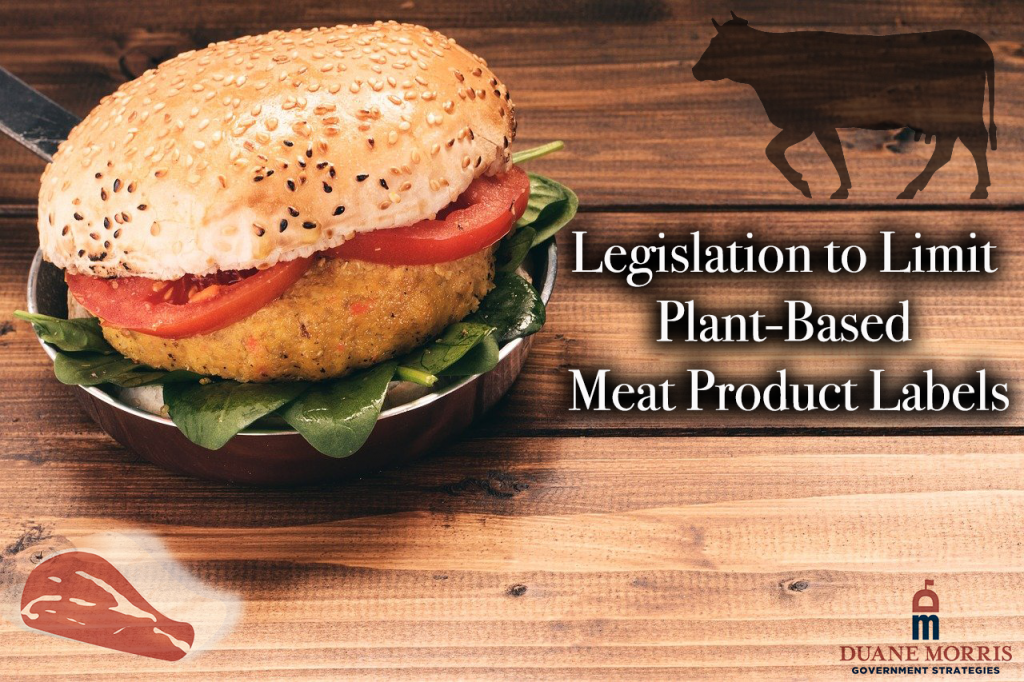
The COVID-19 pandemic has dramatically impacted the U.S. meat industry since last year. Major producers had to shut down production when workers were exposed to and infected with the coronavirus at meat production facilities. The Good Food Institute estimated the sale of plant-based meat alternatives was $940 million in the U.S. in 2019, while sales of beef cattle in Texas alone generated $9 billion. The Good Food Institute also reported plant-based meat substitute sales jumped 17% from 2018 to 2019.
In May of last year, a report indicated plant-based meat products surged 264% from March to April, representing a $25.7 million increase in sales. Meanwhile, traditional meat product production saw a $3.8 billion, or 45% increase over the same period.
With the rise of imitation meat products in the market, some have grown concerned over plant-based meat product labels and how such products should label and market themselves. Some lawmakers at the state and federal levels hope to resolve this issue through legislation. However, such laws passed in some states are subject to ongoing litigation over whether they violate the First Amendment and the right to free speech.
Plant-based meat product label-related legislation has passed in numerous states, including Missouri, Arkansas, Alabama, Colorado, Kentucky, Louisiana, Mississippi, Montana, North Dakota, Oklahoma, South Carolina, South Dakota, and Wyoming, with more potentially on the horizon.
Texas
Texas is the nation’s top cattle producer. It is no surprise state lawmakers introduced a bill this session related to the advertising and labeling of certain meat food products. HB 316, the Texas Meat and Imitation Food Act, seeks to clarify definitions of various words such as “meat” and “beef.”
Specifically, the bill would define “beef” as any edible portion of a formerly live and whole cattle carcass, not derived by synthetic or artificial means. The bill defines “chicken” similarly as any edible portion of a formerly live and whole poultry carcass, not derived by synthetic or artificial means. “Pork” is defined as any edible portion of a formerly live and whole swine carcass, not derived by synthetic or artificial means.
HB 316 further defines “meat” as any edible portion of livestock (cattle, sheep, swine, goats, and poultry) carcasses that do not contain lab-grown, cell-cultured, insect, or plant-based food products. The bill stipulates a food advertised or labeled as containing or imitating meat is misbranded if:
- Any part of its labeling is false or misleading;
- The food is misrepresented as harvested meat using any misleading or deceptive advertising or labeling,
- Any portion of the food’s advertising or labeling suggests or implies the food imitates meat, beef, chicken, or pork when the food does not,
- The food includes a label stating “meat,” “beef,” “chicken,” “pork,” or any common variation of those terms if the food does not contain the products listed on its label, and
- The food’s label includes a claim comparing the food’s nutritional value to that of meat without disclosing the food’s human benefit.
HB 316 has not been voted on yet this session, while an identical bill in the 2019 legislative session had a hearing without being voted on.
Missouri
Missouri became the first in the nation to regulate how food manufacturers use the word “meat” in 2018 with the passage of Senate Bills 627 and 925.
The bill states that no person advertising, offering for sale, or selling all or part of a carcass or food plan shall engage in any misleading or deceptive practices, including misrepresenting the cut, grade, brand or trade name, or weight or measure of any product, or misrepresenting a product as meat that is not derived from harvested production livestock or poultry.
“Meat” is defined as any edible portion of livestock, poultry, or captive cervid carcass for human consumption. “Meat product” is defined by the law as anything containing meat intended for or capable of use for human consumption, which is derived in whole or in part, from livestock, poultry, or captive cervids.
Despite Missouri being the first state to pass such a law, legal challenges have followed.
Arkansas
Lawmakers in Arkansas passed HB 1407 in 2019. The bill’s goal was to “require truth in labeling of agricultural products that are edible by humans.”
The bill prohibits products affixed with false or misleading labels and selling an agricultural product under another food name. The bill also prohibits representing an agricultural product as meat or a meat product when the product is not derived from harvested livestock, poultry, or cervids, representing an agricultural product as rice when it is not rice, representing an agricultural product as beef or a beef product when it is not derived from a domesticated bovine, and representing the agricultural product as pork or a pork product when it is not derived from a domesticated swine.
The bill further prohibits utilizing a term that is the same as or similar to a term that has been used or defined historically about a specific agricultural product.
HB 1407 defines “livestock” as swine, bovines, sheep, and goats and “meat” as a portion of a livestock, poultry, or cervid carcass edible by humans. The bill also states “meat” does not include a synthetic product derived from a plant, insect, or other source, or a product grown in a laboratory from animal cells. The bill also defines a “meat product” as an agricultural product edible by humans and made wholly or partly from meat or another portion of a livestock, poultry, or cervid carcass.
While the bill was initially slated to go into effect in July 2019, the new law was engulfed in a lawsuit claiming it was unconstitutional. A federal judge later banned enforcement of the law.
Kansas
Last session, lawmakers in Kansas introduced HB 2437 to prohibit identifiable meat terms on labels. The bill would have amended the Kansas Food, Drug, and Cosmetic Act to include new terms, including “meat analog” and “identifiable meat term,” and specify when these foods would be deemed “misbranded.” HB 2437 died before the end of the session.
The bill defined “meat analog” as any food that approximates the aesthetic qualities or chemical characteristics of any specific type of meat, meat food product, poultry product, or poultry food product, but does not contain any meat, meat food product, poultry product, or poultry food product. The bill also defined “identifiable meat term” to include the terms: meat, beef, pork, poultry, chicken, turkey, lamb, goat, jerky, steak, hamburger, burger, ribs, roast, bacon, bratwurst, hot dog, ham, sausage, tenderloin, wings, breast, and other terms for food which contain any meat.
The House Committee on Agriculture held a hearing on the bill in January of 2020, where the bill’s proponents and opponents testified. The Kansas Livestock Association and Kansas Pork Association provided testimony in support of HB 2437, arguing manufacturers of meat analogs should be required to label and advertise their products accurately and noted the bill would not ban the use of an “identifiable meat term,” but instead require a disclaimer on a meat-analog label. Opponents of the bill, including the Good Food Institute, Kansas Justice Institute, and the Kansas Restaurant and Hospitality Association, indicated the bill would compel the use of certain words in labels and advertisements and require the creation of Kansas-specific labels.
A representative from the Kansas Livestock Association argued that the Kansas cattle industry suffers from shoppers who accidentally buy vegetarian alternatives. In contrast, the Good Food Institute argued the sales of the items are growing because people want to seek meat alternatives.
Nebraska
In 2019, Legislative Bill 14 was introduced in Nebraska. The bill’s goal was to “provide for truth in advertising and labeling in the sale of meat and food plans.” The bill provided definitions for meat-related terms, prohibited misleading or deceptive practices, and provided penalties for violations.
Specifically, LB 14 defined “food plans” as any plan offering meat for sale or the offering of meat in combination with any other food or nonfood product or service for a single price, “livestock” as cattle, calves, sheep, swine, ratite birds including ostrich and emu, llamas, alpaca, bison, elk, goats, horses, and rabbits raised in confinement for human consumption. The bill also defined “meat” as any edible portion of any livestock or poultry carcass or part thereof and does not include lab-grown or insect or plant-based food products.
The bill also stipulated that no one who advertises, offers for sale, or sells meat or a food plan to engage in any misleading or deceptive practices, including misrepresenting a product as meat that does not come from livestock or poultry. Violators of this bill would be guilty of a Class I misdemeanor.
LB 14 was withdrawn before any action was taken on the bill.
Maryland
During the last session, Senate Bill 188 was introduced to address misbranded food/meat products. Specifically, the bill stated that a food is misbranded if it is offered for sale in Maryland with a label that identifies the product as meat or meat product and the product either contains animal tissue cultured from animal cells outside the animal from which the tissue comes from, or is made from plants or insects.
Senate Bill 188 was reported unfavorably from the Senate Finance Committee in February of 2020 and has yet to be reintroduced this session.
Federal Action
In the 116th Congress, the Real MEAT Act of 2019 (H.R. 4881 / S. 3016) was introduced in both the House of Representatives and Senate. In the House, the bill was referred to the Committee on Agriculture’s Subcommittee on Livestock and Foreign Agriculture and the Committee on Energy and Commerce’s Subcommittee on Health. In the Senate, the bill was referred to the Committee on Health, Education, Labor, and Pensions. Neither bill was marked up or received a hearing. Reintroductions of the bill in the 117th Congress have not yet been announced.
Latest News
Photo credit: iStock.com/Larisa Stefanuyk We last covered human body composting legislation in 2021. As we noted then, Washington State was the first state to allow for human body composting. Washington was soon followed by Colorado [...]
Photo credit: iStock.com/Maha1450 In honor of Presidents’ Day, there is no better time than now to reflect on the significant legislative and executive achievements of our nation's leaders. Throughout the last nearly 250 years, each [...]
Photo Credit: iStock.com/William_Potter H.R. 3746 is a complex bill that aims to address critical financial issues in the United States. It suspends the debt ceiling, imposes spending limits, introduces work requirements, and adjusts energy permitting [...]
Photo credit: iStock.com/BackyardProduction On March 9, 2023, the White House released President Biden’s proposed budget for Fiscal Year 2024. The budget, representing $6 trillion in spending, aims to address several key issues, including climate change, [...]






Stay In Touch